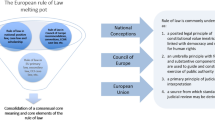Abstract
Many of the current debates in jurisprudence focus on articulating the boundaries of law. In this essay I challenge this approach on two separate grounds. I first argue that if such debates are to be about law, their purported subject, they ought to pay closer attention to the practice. When such attention is taken it turns out that most of the debates on the boundaries of law are probably indeterminate. I show this in particular with regard to the debate between inclusive and exclusive positivists: I present several ways of understanding what this debate is about and argue that none of them is defensible. My second argument focuses more on the purpose of jurisprudential inquiry. I argue there that even if some jurisprudential debates have determinate answers, it does not follow that they deserve our attention, because not all true facts are worth knowing. After discussing and rejecting the claim that jurisprudence could be justified as knowledge for its own sake, I propose one possible justification for engaging in legal philosophy and outline its implications for the kind of issues that should be pursued.
Similar content being viewed by others
Author information
Authors and Affiliations
Corresponding author
Additional information
Assistant Professor, University of Warwick School of Law. The Essay was presented in the Oxford Jurisprudence Discussion Group. I thank participants there for their comments.
Rights and permissions
About this article
Cite this article
Priel, D. The boundaries of law and the purpose of legal philosophy. Law and Philos 27, 643–695 (2008). https://doi.org/10.1007/s10982-008-9030-1
Received:
Accepted:
Published:
Issue Date:
DOI: https://doi.org/10.1007/s10982-008-9030-1




